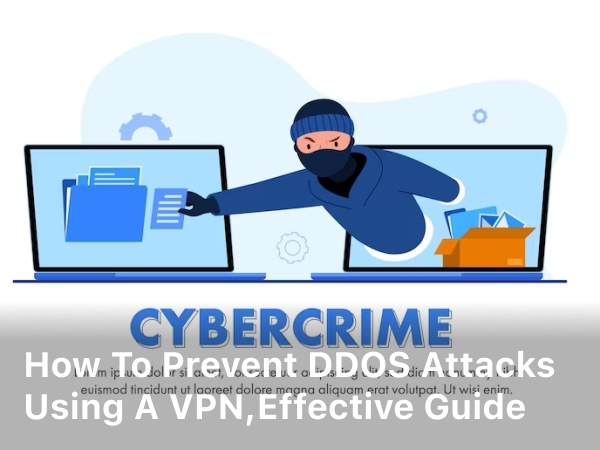How To Prevent DDoS Attacks Using a VPN, Effective Guide – Learn how to prevent DDoS attacks using a VPN and protect your online presence. This comprehensive guide provides expert insights and actionable tips to safeguard your network from potential threats.
In today’s digital age, cyber threats are becoming increasingly sophisticated, and Distributed Denial of Service (DDoS) attacks are a significant concern for businesses and individuals alike. These attacks can cripple websites, networks, and online services, leading to data breaches, financial losses, and reputational damage. Fortunately, a reliable solution to defend against DDoS attacks is using a Virtual Private Network (VPN).
This article explores the ins and outs of using a VPN to safeguard your online assets and maintain a secure online experience.
How To Prevent DDoS Attacks Using a VPN
What Is a DDoS Attack?
A DDoS (Distributed Denial of Service) attack is a malicious attempt to disrupt the normal functioning of a target’s online services or network infrastructure. In a DDoS attack, the assailant overwhelms the target with an excessive volume of traffic or data from various sources, causing a denial of service to legitimate users.
Here’s how a DDoS attack works:
- Multiple Sources: Unlike a traditional DoS attack that originates from a single source, a DDoS attack involves multiple sources, often controlled by the attacker. These sources could be compromised computers, smartphones, or other internet-connected devices forming a botnet.
- Target Selection: The attacker selects a specific target, such as a website, an online service, or an entire network, with the intent to disrupt its operations.
- Traffic Flooding: The attacker directs a massive amount of traffic or data towards the target simultaneously. This flood of incoming requests overwhelms the target’s servers or network infrastructure, rendering it incapable of handling legitimate user requests.
- Denial of Service: As a result of the overwhelming traffic, the target’s services become inaccessible to legitimate users. Websites may become slow or unresponsive, and online services may experience downtime.
DDoS attacks can take various forms, including:
- Volumetric Attacks: Involves sending a vast amount of junk traffic to flood the target’s bandwidth, exhausting its resources.
- TCP State Exhaustion Attacks: Exploits the limited number of concurrent connections a server can handle, leading to a denial of service.
- Application Layer Attacks: Targets specific applications or services to overwhelm them with malicious requests, exploiting vulnerabilities in their design.
- DNS Amplification Attacks: Utilizes open DNS resolvers to flood the target with amplified DNS response traffic.
DDoS attacks are often carried out for malicious purposes, such as:
- Extortion: Attackers may demand a ransom to stop the DDoS attack and restore services.
- Competitive Advantage: Businesses or individuals may employ DDoS attacks against competitors to gain a competitive edge.
- Hacktivism: Activists may use DDoS attacks to protest or raise awareness about specific issues.
- Cyber Warfare: Nation-states or politically motivated groups may launch DDoS attacks to disrupt critical infrastructure or government websites.
DDoS attacks pose significant risks to businesses, organizations, and individuals, as they can lead to financial losses, reputational damage, and customer dissatisfaction. Implementing DDoS protection measures and using security solutions can help mitigate the impact of such attacks and ensure a more secure online environment.

Do VPNs Stop DDoS Attacks?
Yes, Virtual Private Networks (VPNs) can help mitigate Distributed Denial of Service (DDoS) attacks to some extent. A DDoS attack aims to overwhelm a target’s server with an enormous amount of traffic from multiple sources, rendering it inaccessible to legitimate users. While a VPN cannot completely stop DDoS attacks, it does add an essential layer of protection against such threats.
Here’s how a VPN can help in DDoS attack prevention:
- IP Address Masking: A VPN masks your real IP address and replaces it with the IP address of the VPN server you connect to. This way, your actual IP address remains hidden from potential attackers, making it harder for them to target your network directly.
- Encryption and Tunneling: VPNs encrypt your internet traffic and route it through secure tunnels. This encryption ensures that any data transmitted between your device and the VPN server is scrambled and cannot be easily intercepted by malicious actors.
- Changing Attack Surface: By routing your traffic through a VPN server, you change your attack surface. Attackers typically target specific IP addresses, but with a VPN, your IP address constantly changes based on the server you connect to. This makes it more challenging for attackers to pinpoint your actual location.
- DDoS Protection Features: Some VPN providers offer dedicated DDoS protection as part of their services. These protection mechanisms can detect and mitigate DDoS attacks in real-time, diverting malicious traffic away from your network.
Despite these benefits, it’s essential to understand that a VPN’s primary purpose is not to protect against DDoS attacks. It primarily serves to enhance online privacy and security. Additionally, the effectiveness of a VPN in DDoS mitigation may vary depending on the attack’s intensity and the VPN provider’s infrastructure.
For optimal DDoS protection, it’s crucial to choose a reputable VPN service that offers strong encryption, a wide network of servers, and dedicated DDoS protection features.
Remember that while a VPN can significantly reduce the risk of DDoS attacks, no solution can guarantee absolute prevention. It is essential to employ a multi-layered security approach and stay informed about the latest threats to maintain a secure online presence.
Keep Reading : Discovering the Best External SSD for Console Gaming
The Role of a VPN in DDoS Prevention
A VPN acts as a protective shield against DDoS attacks by masking your real IP address and routing your internet traffic through encrypted tunnels. This process ensures that your online activities remain anonymous, making it difficult for attackers to identify and target your network.
Choosing the Right VPN for DDoS Prevention
Not all VPNs offer the same level of protection against DDoS attacks. Look for features such as robust encryption, a vast network of servers, and dedicated DDoS protection. Research reputable VPN providers and read customer reviews to make an informed decision.
Setting Up Your VPN: Step-by-Step Guide
- Selecting the Right VPN Plan: Opt for a VPN plan that best suits your needs, whether it’s for personal use or business purposes.
- Downloading and Installing the VPN Client: Install the VPN client on your device, ensuring compatibility with your operating system.
- Logging In and Configuring the Settings: Follow the provider’s instructions to log in and customize your VPN settings for optimal security.
- Connecting to a Server: Choose a server location that aligns with your online activities, and connect to it through the VPN client.
- Enabling DDoS Protection: If your VPN offers dedicated DDoS protection, enable it within the settings for an added layer of security.
Keep Reading : Top 9 Best Cyberpunk Mobile Games for Android Phone
VPN Dos and Don’ts for DDoS Protection
- Do Regularly Update Your VPN Software: Keep your VPN client up to date to ensure you have the latest security patches and features.
- Do Enable Kill Switch: Enable the kill switch feature in your VPN settings to prevent data leaks in case of unexpected disconnections.
- Don’t Use Free VPNs: Free VPNs might not provide adequate security against DDoS attacks and may compromise your data privacy.
- Don’t Share Your VPN Credentials: Keep your VPN username and password confidential to prevent unauthorized access.
Testing Your VPN for DDoS Protection
After setting up your VPN, it’s essential to validate its effectiveness in mitigating DDoS attacks. There are online tools available that allow you to simulate DDoS attacks on your network, providing valuable insights into your VPN’s protection capabilities.
Keep Reading : Free Games Playstation Plus June 2023
FAQs – Frequently Asked Questions
Q: Can a VPN completely stop DDoS attacks?
A: While a VPN can significantly reduce the risk of DDoS attacks, it cannot guarantee absolute prevention. However, it adds a vital layer of protection against such threats.
Q: Is using a VPN legal?
A: Yes, using a VPN is legal in most countries. However, ensure that you comply with the laws and regulations of your specific location.
Q: Can I use a VPN on all my devices?
A: Yes, most VPN providers offer compatibility with various devices, including computers, smartphones, and tablets.
Q: Does a VPN affect internet speed?
A: VPNs may slightly reduce internet speed due to encryption and rerouting processes. However, reputable VPNs prioritize maintaining optimal speed.
Q: Can a VPN prevent other types of cyberattacks?
A: Yes, a VPN can enhance your overall online security and protect against various cyber threats, including phishing and data snooping.
Q: Is it necessary to use a VPN for online gaming?
A: While it’s not mandatory, using a VPN for gaming can provide an extra layer of protection and reduce the risk of DDoS attacks during competitive play.
Conclusion
Protecting your online assets from DDoS attacks is crucial in today’s interconnected world. Using a VPN is a highly effective preventive measure to ensure a secure and uninterrupted online experience. By understanding the mechanisms behind DDoS attacks and following the steps outlined in this guide, you can fortify your digital presence and safeguard against potential cyber threats.






